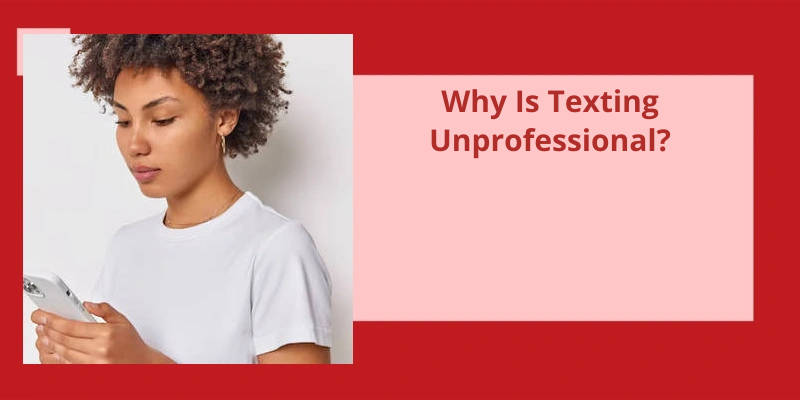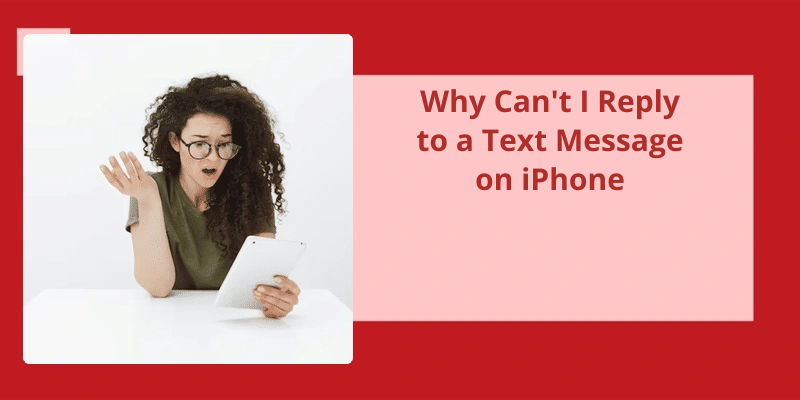Texting has become an integral part of our daily lives, providing a quick and convenient way to communicate with others. However, this widespread use of texting has raised a question regarding it’s professionalism. Is texting an appropriate medium for conducting professional conversations? While it may seem trivial, the informality and brevity of texts can often lead to misunderstandings and misinterpretations. Furthermore, the ease and speed of texting can sometimes tempt individuals to engage in unprofessional behavior, such as making inappropriate jokes or comments that would otherwise be deemed unacceptable in a professional setting. Moreover, messages sent via texting can be easily retrieved and documented, making them susceptible to being used against the sender or recipient in the future. In light of these concerns, it becomes essential to examine why texting is considered unprofessional and explore the potential consequences of relying on this communication method in a professional context.
Are Text Messages Unprofessional?
In todays technologically advanced world, texting has become a widespread and convenient mode of communication. It allows for quick and efficient interactions, making it highly appealing in both personal and professional settings. However, there’s an ongoing debate about whether text messages are unprofessional in certain contexts.
Despite these concerns, it’s important to note that text messages can be professional if used appropriately. A text message can serve as a convenient tool for sharing updates, confirming appointments, or exchanging brief information. It can also be a useful way to maintain open lines of communication with coworkers or team members, especially in fast-paced work environments.
However, it’s crucial to recognize the limitations of texting and understand when it may not be the most suitable form of communication. Text messages are often concise and lack the level of detail that may be necessary for certain professional matters. In such cases, email or face-to-face conversations may be more appropriate to ensure clear and comprehensive communication.
When using texting in a professional context, it’s essential to adhere to some basic guidelines. First, consider the recipient and the nature of the message. If you’re contacting a colleague about a work-related matter, ensure that your message is concise, respectful, and appropriately formal. Avoid using excessive abbreviations or informal language that may be perceived as unprofessional.
Additionally, it’s important to be mindful of timing and context. While text messages are designed for fast and immediate communication, they may not be appropriate for urgent or time-sensitive matters. In such cases, it’s best to rely on more direct means of communication, such as phone calls or face-to-face conversations.
The Role of Text Messages in Professional Settings
Text messages play a crucial role in professional settings as they provide a quick and convenient means of communication. Despite their efficiency, texting can be viewed as unprofessional due to various reasons.
Firstly, the informality of text messages can lead to a lack of clarity and proper communication etiquette. Abbreviations, emojis, and informal language can be misunderstood or seen as unprofessional by recipients.
Secondly, text messages offer limited space for conveying complex information or discussing detailed matters. The brevity of texts can hinder effective communication, potentially leading to misinterpretation.
Furthermore, the immediacy of text messages can blur boundaries between work and personal life. Texting after working hours or on weekends may be seen as invasive and disrupt the work-life balance, making it important to establish clear communication expectations.
While text messages can be useful for quick updates or urgent matters, it’s essential to consider their appropriateness in professional settings. Whenever possible, opting for more formal communication methods such as email or face-to-face discussions is advisable to maintain professionalism and ensure effective communication.
It’s no secret that texting has become an integral part of modern communication. However, while it may seem convenient and efficient, experts warn that excessive texting can actually harm relationships. As relationship therapist, Kurt Trub, explains, texting can transform from a helpful tool into a hindrance, creating a barrier to truly meaningful interactions. Moreover, constant texting can stem from feelings of loneliness or boredom, eventually resulting in a sense of isolation and alienation.
Why Does Texting Ruin Relationships?
Texting is often seen as unprofessional due to the informal and casual nature of the medium. In professional settings, such as business or academic environments, clear and concise communication is crucial. The lack of tone, body language, and context in text messages can easily lead to misunderstandings or misinterpretations, which can negatively impact relationships.
Furthermore, the constant availability and immediacy of texting can lead to a sense of entitlement. People may feel that they should always be able to reach someone via text, regardless of their availability or preferences. This can create pressure and stress in relationships, as individuals may feel obligated to respond promptly and be constantly connected.
Moreover, texting lacks the personal touch and emotional connection of more personal forms of communication. It’s difficult to convey empathy, sincerity, or genuine care through text messages alone. This can hinder the development of deep and meaningful relationships, as important aspects of human interaction are lost.
Lastly, texting can be a source of distraction and can interfere with in-person interactions. When individuals are constantly engaged in texting conversations, they may become less present and attentive in their real-life relationships. This can lead to feelings of neglect or detachment, ultimately damaging the quality of the relationship.
Overall, while texting can be convenient and efficient in certain contexts, it’s important to recognize it’s limitations and potential negative impacts on relationships, particularly in professional settings. It’s crucial to maintain a balance between technological communication and more personal forms of interaction to foster meaningful connections.
Source: It’s complicated: Our relationship with texting
In addition to the previous reasons, texting can also be worse than talking face to face due to the limited information it conveys. Without the ability to express tone or rely on nonverbal cues like body language, messages can easily be misunderstood, leading to potential communication breakdowns.
Why Is Texting Worse Than Talking Face to Face?
Texting is often considered unprofessional due to it’s limitations in conveying tone and nonverbal cues. When we communicate face to face, we can rely on various factors such as tone of voice, facial expressions, and body language to accurately interpret the intended message. However, with texting, all we’ve is plain text, which can easily be misinterpreted.
Without the benefit of visual and auditory cues, it’s harder to discern sarcasm, humor, or seriousness in a text message. A simple statement can be misconstrued and lead to misunderstandings or even conflict. For example, a lighthearted joke may come across as offensive or insensitive when read without the context of a persons tone or facial expressions.
Moreover, text messages often lack the depth and richness of a real-time conversation. In-person conversations allow for immediate responses and a back and forth exchange, ensuring a clearer understanding of each others perspectives. With texting, there can be delays in responses, causing a disjointed conversation that lacks the same level of engagement and attentiveness found in face-to-face interactions. This can create frustration, impede effective communication, and ultimately be perceived as unprofessional.
Furthermore, texting tends to promote brevity and conciseness. While this can be advantageous in certain situations, it may also lead to important details being overlooked or omitted. In professional settings, it’s crucial to provide comprehensive information to ensure clarity and avoid any potential confusion or mistakes. Textings limitation on the amount of information conveyed can lead to misunderstandings and errors that could have been avoided through a more thorough conversation.
Additionally, text messages are often perceived as a less formal means of communication. In professional settings, where formalities and etiquette are valued, texting may be seen as too casual or informal. It may give the impression of a lack of professionalism or seriousness, potentially affecting ones credibility and reputation. As a result, many employers, colleagues, and clients prefer more traditional forms of communication, such as email or face-to-face meetings.
While text messaging has it’s advantages in terms of convenience and ease, it’s important to use it thoughtfully and be aware of it’s limitations in professional settings.
Excessive and aggressive texting can have detrimental effects on relationships, breeding control and abuse. If you find yourself dealing with someone who constantly demands to know your whereabouts and activities, it might be necessary to prioritize your well-being by creating distance from such behavior.
Why Is Texting Toxic?
Texting can often become toxic and detrimental to relationships, especially when it crosses the line into controlling or abusive behavior. Excessive texting, particularly when it involves constant demands for information about someones whereabouts, personal interactions, and activities, can create a toxic environment. This form of communication can lead to a loss of personal boundaries and autonomy, eroding trust and emotional well-being.
When an individual feels constantly monitored through text messages, it can give rise to feelings of suffocation and invasion of privacy. The incessant need to know every detail of someones life demonstrates a lack of trust and respect, fostering an unhealthy power dynamic within the relationship. It becomes imperative for individuals who find themselves in such situations to distance themselves from toxic texters and establish healthier boundaries.
Moreover, the demanding nature of excessive texting can exacerbate feelings of anxiety and stress. Constantly being bombarded with messages that demand immediate responses can be overwhelming and emotionally draining. The pressure to provide constant updates and account for ones actions can make individuals feel like they’re constantly under scrutiny, leading to heightened stress levels and a diminished sense of personal well-being.
In addition, texting can promote an unhealthy reliance on screens and technology, leading to decreased interpersonal skills and a diminished ability to connect on a deeper level. Regular and excessive texting can hinder the development of emotional intimacy, as meaningful conversations and shared experiences become replaced by surface-level interactions through screens.
The constant need for information and demands for attention can breed an environment of control and abuse, eroding trust and personal boundaries. It’s crucial to recognize these toxic patterns and create healthier boundaries for a more fulfilling and respectful relationship.
The Long-Term Effects of Texting Toxicity on Mental Health
Texting toxicity refers to the negative and harmful behavior that can occur in text conversations. This can include various forms of toxicity such as bullying, harassment, and verbal abuse. The long-term effects of texting toxicity on mental health can be significant.
Consistently experiencing toxic behavior through text messages can lead to increased stress, anxiety, and feelings of low self-worth. Engaging in or being the target of toxic conversations can also contribute to feelings of isolation and depression.
Additionally, texting toxicity can impact relationships, both personal and professional. Negative interactions via text can strain friendships, family ties, and workplace dynamics. This can lead to decreased social support and a sense of disconnection from others.
It’s important to recognize the impact that texting toxicity can have on mental health and take steps to address and prevent such behavior. Setting boundaries, practicing healthy communication, and seeking support from trusted individuals or professionals can help mitigate the long-term effects of texting toxicity on mental well-being.






